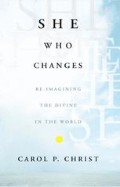Abstract
A question that arises for all of us when we think about the meaning of life is: How do we know? Do we trust the body? The mind? The spirit? Great thinkers? Favorite authors? Friends? Communities? Revealed traditions? And if so, which one or which ones? How do we know what is true? For process philosophy, all knowing comes to us through the body, which is embedded in relationships, both personal and social. Our perceptions are shaped and limited by our bodies and our personal and social locations. If we are open to learning from other individuals, from the natural world, from our bodies, and from Goddess/God, our perspectives become wider. If we are not, we remain narrow, our perspectives shaped and controlled by conventional thinking. Yet no matter how open and interested we are, our knowing will always be fragmentary. Our bodies and the world body are changing from moment to moment. Thus our understanding too may change, develop, or deepen. No one of us will ever have the whole picture. No one of us will ever know the truth, the whole truth, and nothing but the truth. All of our knowing is in some respects uncertain. From one perspective, uncertainty makes life interesting.
Access this chapter
Tax calculation will be finalised at checkout
Purchases are for personal use only
Preview
Unable to display preview. Download preview PDF.
Notes
Gerald Gardner, the founder of modern Witchcraft, created the fiction that Wiccan tradition was passed on in secret from pre-Christian times; see Ronald Hutton, The Triumph of the Moon: A History of Modern Pagan Witchcraft (Oxford: Oxford University Press, 1999)
Copyright information
© 2003 Carol P. Christ
About this chapter
Cite this chapter
Christ, C.P. (2003). Embodied, Embedded Knowing. In: She Who Changes. Palgrave Macmillan, New York. https://doi.org/10.1007/978-1-4039-7679-6_7
Download citation
DOI: https://doi.org/10.1007/978-1-4039-7679-6_7
Publisher Name: Palgrave Macmillan, New York
Print ISBN: 978-1-4039-6669-8
Online ISBN: 978-1-4039-7679-6
eBook Packages: Palgrave Religion & Philosophy CollectionPhilosophy and Religion (R0)

